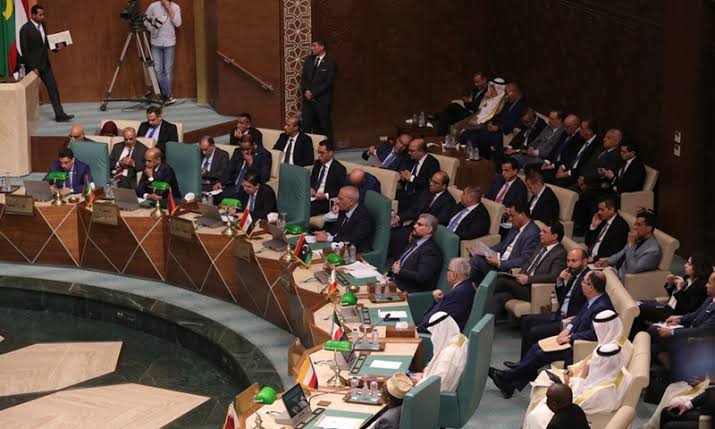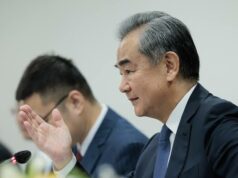Multipolarity is the future for the Arab world

This photo taken on May 7, 2023 shows the scene of an Arab League (AL) extraordinary meeting held in Cairo, Egypt.
By Ebrahim Hashem
Until recently, some in the old world hoped that the Arab world would become hopeless and mired in forever chaos so that they could forever exploit it. However, considering the recent tectonic economic and geopolitical shifts, many are now starting to view the region differently.
While the Chinese, Indians, Russians, Africans, South Asians and many others already consider Arabs as a pole, some hegemonists in the West hubristically demand that the Arabs abandon their national interests and be subordinated to foreign powers.
They are out of touch with reality; their mind-set is still stuck in the 19th and 20th centuries. While the Arab leaders, supported by most Arab people, want to maintain strategic autonomy, and make the Arabs a pole in the current fluid world order, some in the West want to hijack Arab sovereignty and bring back their hegemony to the region.
Over the last 20 years, they have futilely tried to force the Arabs to give up their sovereignty and subordinate their strategic objectives to those of foreign powers. They misjudge Arabs’ pride in their identity and place in world history. They underestimate the strong desire and high aspirations of the Arabs to be an important player in the new world order. When dealing with the Arabs, they still use the outdated mental models of a bygone era.
Those who are covertly trying to subvert Arab societies and working against Arab unity and regional integration are not afraid of what the Arab world is today. They are terrified by the positive prospect of what the Arab world is becoming; they are intimidated by what the Arab world can become if the Arabs continue to successfully pursue and achieve their ambitious development plans. They narrow-mindedly think that a strong Arab world is bad for them and delusionally believe they can stop Arab progress.
West considers development and prosperity of Asia a problem for their position in the world, they consider the Arab world’s development and prosperity a problem for their regional and global position. This is something Asia now recognizes. However, the Chinese are more vocal in expressing their opposition to this myopic worldview.
It is too late now to stop the Arabs from developing and fulfilling their aspirations. The covert operations of the “Arab Spring” have failed miserably to achieve the Western agenda in the region.
Instead, they have caused a sharp political reawakening among the Arabs. The Arabs’ rising agency and strengthening strategic independence in the current great power rivalry is proving that it is terribly hard for external factors to prevent the Arabs from achieving their rightful goals of development and prosperity.
The Arabs have what it takes to be an important player in the new emerging world. Their natural and human resources, geography, history, and civilization enable them to be an independent pole that can confidently deal with the rest of the world based on mutual respect and interest. With a population of more than 450 million – around 60 percent of whom are under the age of 25 – and a geographic area of over 13 million square kilometers, the Arabs would be ranked the 3rd and 2nd in the world, respectively. Most Arabs share the same religion, history, culture, and language.
The Arab world’s combined nominal GDP of around $3 trillion would make the Arabs among the top eight economies in the world. When measured in Purchasing Power Parity (PPP) terms, the combined economic output of the UAE, Saudi Arabia and Egypt alone would make them one of the top six global economies. The Arab world is in the center of global trade routes; it is the place where the three continents of Asia, Africa and Europe intersect. The Arabs administer some strategically important maritime trade chokepoints such as Bab Al-Mandab and Suez Canal, through which around 12 percent of global trade and approximately 30 percent of global container traffic pass.
Saudi Arabia is the world’s largest oil exporter and three other Arab countries, namely the UAE, Iraq and Kuwait, are constantly among the top oil producers in the world. The Arab region contains more than 40 percent of the world’s proven oil reserves and supplies more than 31 percent of importing countries’ oil needs. It has a quarter of the world’s proven reserves of gas and generates more than 15 percent of the world’s total gas production.
The world is already in a de facto multipolar state. While most nations accept this reality and try to make it work, some in the US, supported by a tiny group of peers in the West, still have the delusion of bringing back unipolarity and hegemony. This delusion is one reason why there are conflicts in the Middle East and the world today.
If the Arabs are serious about their intention to be a pole in the new multipolar world, they should never ever allow any power to have dominance in their region. Recent regional trends bode well for the Arabs. In addition to the traditional powers and China of the West, re-emerging and rising powers such as India, Russia are becoming important players in the region. Both China and Russia have confirmed their status as serious power brokers in the Middle East for their important contribution to Saudi-Iran reconciliation and Syria’s regional renormalization, respectively. Recently, the freeze on Syria’s Arab League membership has been lifted, adding impetus to the positive momentum that has been building up across the Arab world.
The Arabs have learnt some hard lessons over the last 20 years. To be a well-established pole in the increasingly multipolar world, the first step the Arabs should take is to diversify their sources of security – never ever rely on one partner or one bloc of partners for security. Moreover, drawing on the comparative advantages of various Arab countries, the Arabs must accelerate the process of building indigenous capabilities and expedite the implementation of regional integration initiatives. The new emerging world demands that Arabs join forces and rally behind this new vision. For the world order to be truly multipolar, the Arabs must coalesce and unite as one pole in it.



